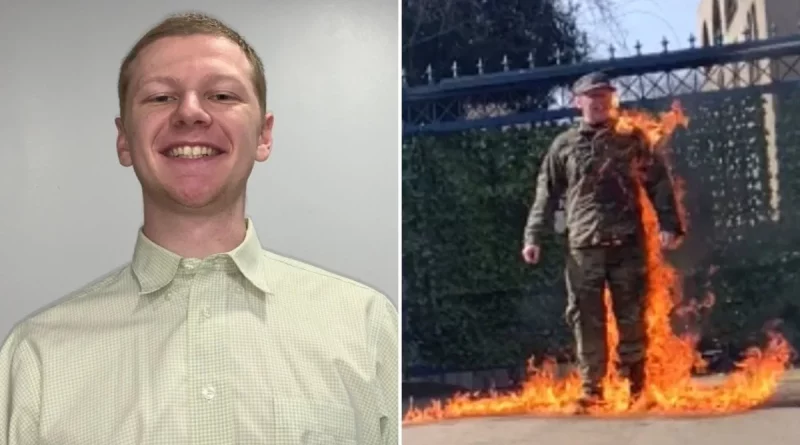Aaron Bushnell – The Ultimate Sacrifice for Peace
Aaron Bushnell’s act of self-immolation outside the Israeli Embassy in Washington, D.C., on February 25, 2024, stands as a stark testament to the deep fissures and emotional turmoil that the Israeli-Palestinian conflict continues to engender worldwide. His drastic measure has stirred a global conversation, touching on themes of protest, mental health, media representation, and the international response to the ongoing violence in Gaza.
Bushnell, a 25-year-old United States Air Force member, explicitly aimed to protest what he viewed as the genocide of Palestinians. In a live-streamed video, he announced his intention to no longer be complicit in these acts, shortly before setting himself on fire and succumbing to his injuries. This act was not only a personal declaration of dissent but also a call to the global community to reevaluate its stance on the conflict in Gaza.
The reactions to Bushnell’s death were diverse and polarized. Domestically, figures across the political spectrum, from activists to politicians like Senator Bernie Sanders, expressed sorrow and concern, framing Bushnell’s act as a desperate plea for attention to the humanitarian disaster in Gaza. Internationally, entities such as Hamas and Iran’s Supreme Leader Ayatollah Khamenei lauded Bushnell as a hero standing against oppression. This spectrum of responses underscores the complex web of sentiments surrounding the Israeli-Palestinian conflict and the various interpretations of resistance and protest.
Vigils in Bushnell’s memory were held in multiple American cities, highlighting a shared grief and a collective call for peace and justice. These vigils served as a focal point for expressions of solidarity with the Palestinian cause, as well as a critique of U.S. military aid to Israel. The gatherings reflected a community’s mourning and a political statement against the ongoing violence in Gaza, symbolizing the broader discourse on the conflict’s morality and the international community’s role in its perpetuation.
The coverage of Bushnell’s act by media outlets has been a subject of scrutiny and debate. Accusations of bias and attempts to dilute the political motives behind his protest point to the challenges of navigating media narratives in highly politicized contexts. The discussion extends into the realm of misinformation, highlighting the complexities of reporting on contentious global issues and the responsibility of media to provide accurate, nuanced coverage.
Bushnell’s sacrifice raises critical questions about the nature of protest and the extent to which individuals are willing to go to voice their opposition to perceived injustices. His actions invite reflection on the efficacy and ethics of such extreme forms of protest, the global response to the Israeli-Palestinian conflict, and the responsibilities of governments and individuals alike in addressing and resolving long-standing humanitarian crises.
In this digital age, where acts of protest can rapidly gain international visibility, Bushnell’s story underscores the power of individual actions to spark global conversations. It also highlights the ongoing debate over how best to advocate for peace and justice in regions torn by conflict. Bushnell’s tragic end serves as a poignant reminder of the personal costs of conflict and the desperate measures some feel compelled to take in pursuit of what they believe to be a just cause.
As the world reflects on Aaron Bushnell’s dramatic protest, it is confronted with the stark realities of the Israeli-Palestinian conflict and the urgent need for a resolution that respects the rights and dignities of all involved. Bushnell’s story, though marked by tragedy, prompts a necessary dialogue on the complexities of global conflict, the nature of protest, and the human yearning for peace and justice. Through his act, Bushnell has become a symbol of the profound human cost of conflict and the lengths to which individuals will go to stand against what they perceive as injustice. His legacy, complex and controversial, invites ongoing reflection on the power of individual action in the face of global injustices and the need for a compassionate, comprehensive approach to resolving long-standing conflicts.

